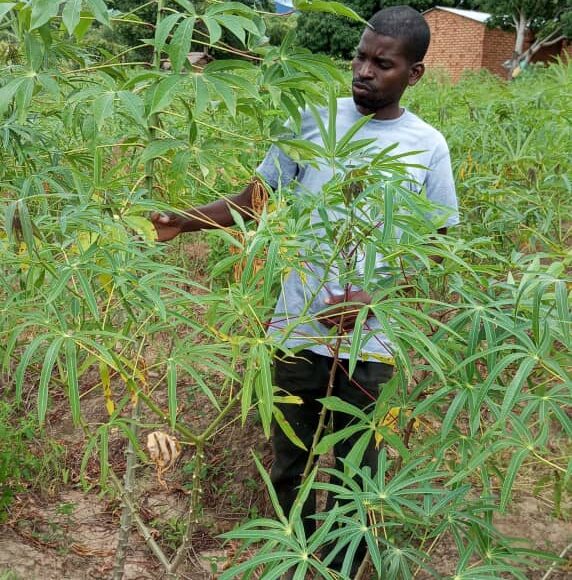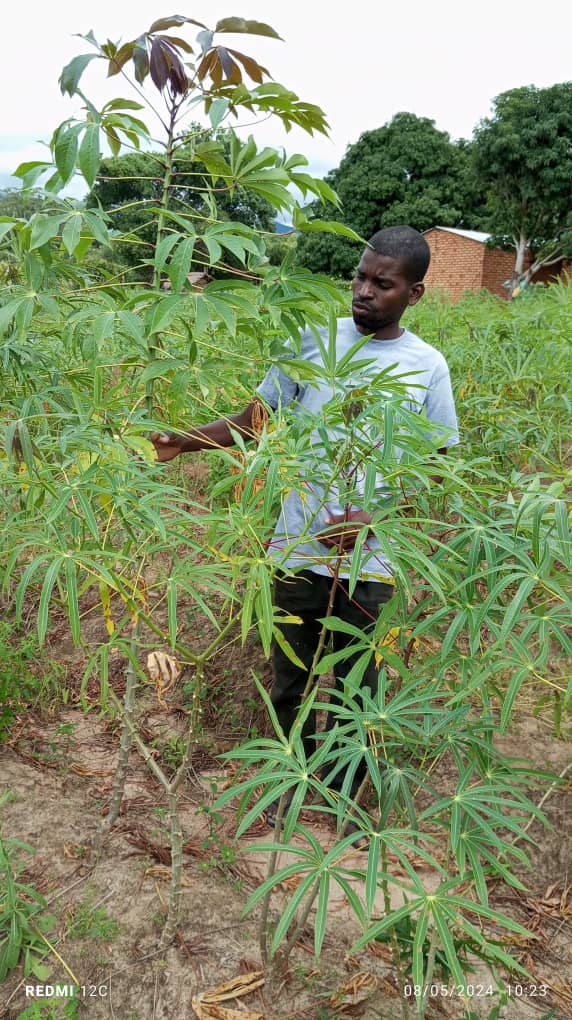
Beyond Fishing: Boosting Biodiversity and Economic Development on Lake Malawi
Over the years, overfishing, pollution, and species loss have threatened Lake Malawi—and the livelihoods of the people who depend on it. Today, fishermen like Maxwell Kaunda are gaining the skills to embrace new ways to make a living, such as cassava farming. In doing so, they are increasing their incomes and protecting the lake’s critical biodiversity.
For 47-year-old fisherman Maxwell Kaunda, Lake Malawi once represented opportunity. Then, the fish started to disappear.
Biodiversity and Economic Development on Lake Malawi
In Malawi, over one-third of the population depends on the lake, the third-largest in Africa. For many lakeside communities, fish are a staple part of the diet and a key source of income. Lake Malawi is also a biodiversity hotspot, home to over 1,000 fish species. But, the lake is threatened by overfishing, species loss, and pollution.
For years, Maxwell could count on a regular supply of fish from the lake. Each morning, he would take his small dugout canoe out, and each afternoon, he would return with enough fish to feed his family of six and enough left over to sell at the local market. But as the years passed, his catch slowly decreased. Some days, he would come home empty-handed.
“Before, I was only focused on going to the lake to fish, and that was my only option,” Maxwell shared. “Being on the lake consistently was a great risk to my life, and the gains were small considering the small catches. I was not even able to pay for family necessities.”
Unpredictable weather can lead to dangerous conditions on Lake Malawi, posing safety risks for fishers like Maxwell. The lack of safety equipment and modern fishing gear further exacerbates risks on the lake, leading to accidents and fatalities. Moreover, over the years, the communities around Lake Malawi have faced the reality of increasing demand for fish. Fishers were not catching enough fish to feed their families, let alone supply the market. It was pushing them into poverty and hindering economic growth.
Restoring Lake Malawi: Livelihoods Beyond Fishing
It became clear that one way to address this challenge was to help lakeside communities transition to alternative livelihoods that do not involve fishing.
The Malawi government recognized the urgent need to conserve Lake Malawi’s freshwater biodiversity and increase economic development. The Restoring Fisheries for Sustainable Livelihoods in Lake Malawi (REFRESH) project was designed to address these challenges. REFRESH is a United States Agency for International Development-funded project led by Pact.
Through the program, TechnoServe has been working to formalize small businesses, known as conservation enterprises, working around Lake Malawi. In doing so, these businesses can provide employment and market opportunities for lakeside communities, contributing to the growth of the local economy.
Through the conservation enterprises, fishers receive technical support to transition to other profitable ventures, such as:
- Cassava cultivation
- Chili production
- Rice farming
- Groundnut production
- Horticulture
- Beekeeping and honey production and
- Ecotourism
A New Start with Cassava
For Maxwell, being anything other than a fisherman never crossed his mind. Then, in 2022, he was introduced to a woman-led conservation enterprise called AGRICOT. It trains fishers in the community to become cassava farmers. With support from TechnoServe, AGRICOT has distributed cassava stem cuttings to 234 fishers and guaranteed them a market for their cassava come harvest season, contributing to local economic development.
Since learning to grow cassava, Maxwell has seen significant improvements in his life. He currently sells his cassava to AGRICOT and is making enough money to feed his family and purchase other necessities.
Now I am proud that I have been cultivating cassava on two acres of land,” Maxwell said. “The money I was getting from fishing cannot compare to my sales now. The quality of my life has greatly improved, and I have even managed to save some money to invest in small businesses.”

A Conservation Enterprise Increases Economic Development
Linda Jumah, who started AGRICOT in 2010, is excited to be part of the REFRESH project because of the positive changes in attitudes toward conservation she has witnessed from the fishers in her area.
She recalls how, initially, there was a lot of resistance to Lake Malawi conservation efforts promoted by REFRESH and Malawi’s Department of Fisheries. Fishers must observe closed fishing seasons and are not allowed to use certain types of nets to catch fish.
Through her interactions with the fishers, Linda noted that they now acknowledge that they cannot solely depend on the lake for daily income but can engage in other economic activities within the area while complying with closed fishing seasons.
“Before AGRICOT got involved in the REFRESH project, we were not directly engaging with the fishing community,” Linda explained. “Now we are more conscious of conservation issues surrounding Lake Malawi, and we are very deliberate in seeking out fishermen that we can train in cassava cultivation. We assure them of a ready market through our business. In so doing, we are in partnership with them.”
Linda has high hopes for her business. She wants to produce cassava flour at higher volumes, which means engaging more farmers in cassava production. She also plans to expand into new markets and gain access to new customers in Malawi and beyond.
Win-Win Solutions Boost Economic Development on Lake Malawi
Maxwell’s journey from fisherman to cassava farmer illustrates the potential for win-win solutions that protect biodiversity and increase farmers’ incomes. As more fishers like Maxwell embrace alternative livelihoods, there is hope for the restoration of Lake Malawi’s fisheries and the prosperity of its surrounding communities.
Since its start, the REFRESH project has facilitated successful linkages between fishing communities and 15 conservation enterprises. By March 2024, over 6,020 individuals had embraced alternative livelihoods promoted by 15 conservation enterprises in ecotourism, cassava farming, horticultural production, and more.
“The coming of this conservation project in my area has opened our eyes as fishermen,” Maxwell shared. “There has been a lot of damage that has been happening around Lake Malawi because of the unsustainable fishing practices we used to engage in. Now we have a role to play to ensure that we help replenish the fish stocks in the lake for the sake of future generations.”
RELATED CONTENT:
- Innovative Business Owner Plays Her Part in Conserving Lake Malawi’s Shoreline Biodiversity
- Learn more about TechnoServe’s work in Malawi
- What is Regenerative Business?





